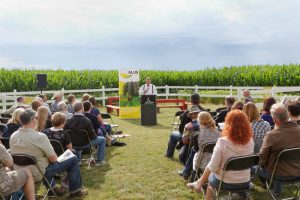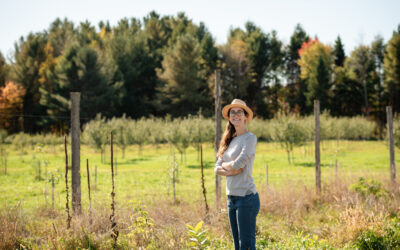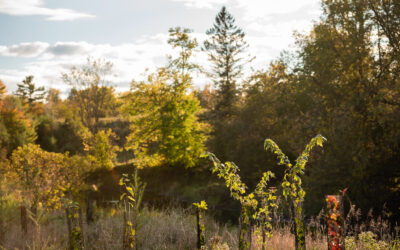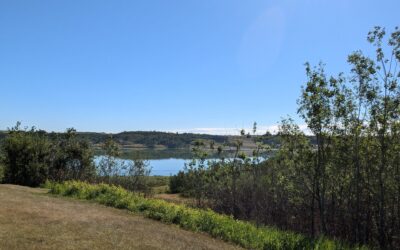ALUS Canada announcement at the Edmonton Corn Maze
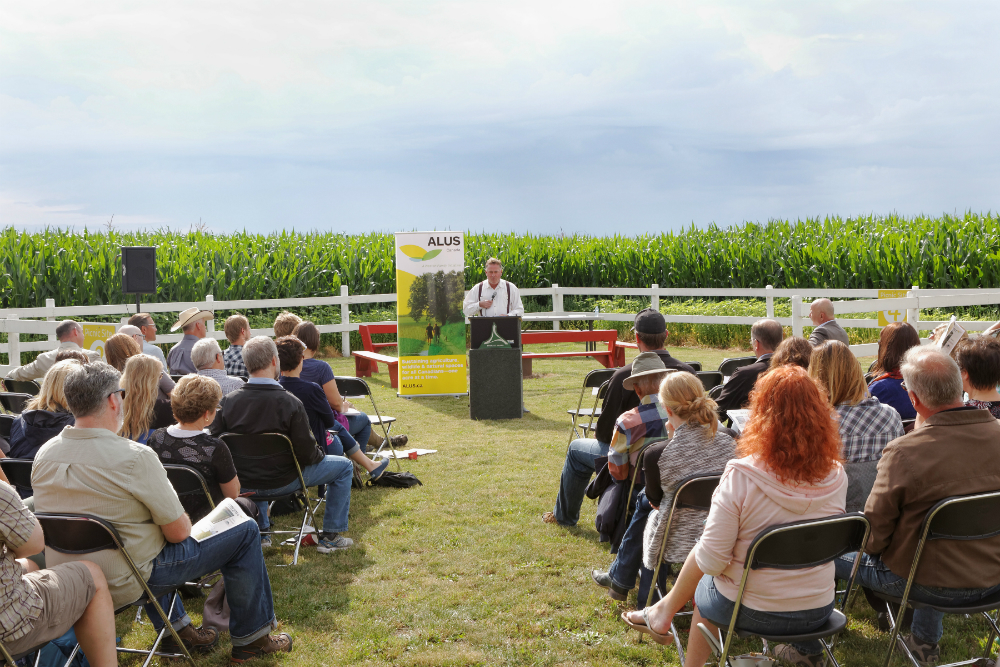
More than 130 people gathered at the Edmonton Corn Maze on July 28, 2016, to celebrate the official relaunch of ALUS Canada in Alberta.
Now known as ALUS Canada, a Weston Family Initiative, ALUS is a national program that engages farmers and ranchers to produce ecosystem services on their land.
Joined by ALUS Canada’s board members Paul Douglas and Larry Kaumeyer—and with the Manager of the Windermere Way Loblaw’s Store, Lori Bucsis, representing The W. Garfield Weston Foundation—ALUS Canada’s CEO Bryan Gilvesy announced that the ALUS program is expanding rapidly across Canada, particularly in Alberta.
“Since 2010, ALUS Canada has invested nearly $674,000 in Alberta’s ALUS communities, where participants are now devoting more than 3,600 acres to producing cleaner air, cleaner water and more biodiversity for all Albertans,” said Gilvesy.
In recent years, seven Alberta counties have signed on with ALUS Canada, joining the original three communities for a total of ten ALUS programs in this province alone.
“Right out of the gate in Alberta, the ALUS concept has been championed by community leaders who are truly passionate about it.” said Gilvesy. “This kind of success can only occur with strong community leadership, which has always been the backbone of the ALUS program.”
No less than five community leaders spoke in support of ALUS, including Rod Shaigec (mayor, Parkland County), Bart Guyon (reeve, Brazeau County, and ALUS participant), Jim Wood (mayor, Red Deer County), John Whaley (mayor, Leduc County) and Ed Park (deputy reeve, County of Vermilion River), representing reeve Daryl Watt.
Prominently displayed at their podium was a bright green Alberta Emerald trophy. ALUS’ Shared Footprint Award, sponsored by the Alberta Real Estate Foundation (AREF), was presented earlier this year in recognition of ALUS’ benefits for the people of Alberta. (More on the Emerald Award here.)
In addition to recognizing The W. Garfield Weston Foundation as ALUS Canada’s primary philanthropic partner, Gilvesy thanked several major supporters for their backing in Alberta.
For instance, the Carthy Foundation has provided $25,000 for research, the AREF has granted ALUS $30,000 to develop a communications and outreach strategy to help increase awareness of the ALUS program, and the National Conservation Plan has given ALUS Canada $170,000 to restore and conserve wetland and upland habitats in Alberta.
Following the press conference, guests toured the Edmonton Corn Maze’s ALUS project, where a community of perennial plants, forbs, trees and shrubs has been established to serve as an “eco-buffer” between the corn maze and nearby Wedgewood Creek.
ALUS Parkland Program Coordinator Darren Haarsma and Agroforestry and Woodlot Extension Society (AWES) technician Luke Wonneck explained how the project works: By absorbing nutrients and sediment from the corn plantation, the eco-buffer helps to improve water quality downstream, while also producing local habitat for pollinators, birds and beneficial insects.
The owners of the Edmonton Corn Maze, ALUS Parkland participants Dan Horneman and Jesse Kraay, receive technical support and annual payments from ALUS to help them maintain this important, one-acre project.
Visiting the Edmonton Corn Maze’s ALUS project served as the kick-off to ALUS Parkland’s annual farm tour, a sold-out event during which three busloads of guests saw ALUS projects across the County.
For ALUS Canada’s Western Hub Manager, Christine Campbell, who oversees all Alberta’s ALUS communities, the event was profoundly inspirational. “Seeing people at all levels of the program come together like this, from our farmers and ranchers to our municipal leaders, and from our external partners to our funders and supporters—it really demonstrates why ALUS has been so successful in Alberta.”
ALUS Canada, A Weston Family Initiative, is a national program dedicated to supporting farmers and ranchers who produce cleaner air, cleaner water, more biodiversity and other ecosystem services in their communities. There are currently more than 15,500 projects in six provinces, more than 720 participants, and more than 18,000 acres enrolled in the ALUS program. As a recent Clean50 and Alberta Emerald award winner – and ranked among the exclusive Clean16 – ALUS Canada is a recognized leader in sustainability that offers a unique method for improving the environment, allowing farmers and ranchers to steward their land in a way that benefits all Canadians, one acre at a time.
Photos by Patrick Zen Wan, Advantage Photography
- Brazeau County Reeve Bart Guyon speaks about his experience as an ALUS participant and why he wanted to expand the program to Brazeau County, at ALUS Canada’s Alberta announcement in July, 2016.

